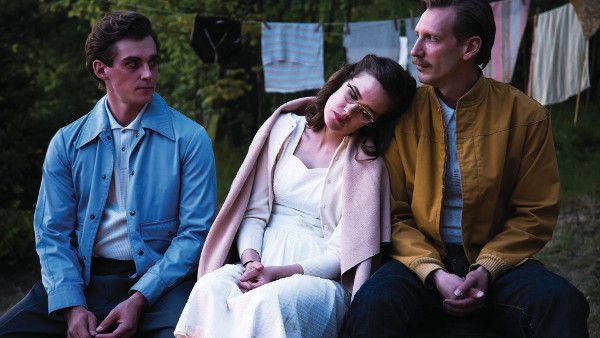Eye For Film >> Movies >> Tom Of Finland (2017) Film Review
Tom Of Finland
Reviewed by: Amber Wilkinson

The name Tom of Finland may not be as widely known generally as it is in the LGBTIQ community who first embraced him, but many of the styles that emerged from the Finnish artist's drawings have become iconic. His sketches of muscular, often mustachioed men in biker gear have attracted a million acolytes down the years, from famous faces like Freddie Mercury, George Michael and the Village People to many on the Seventies gay scene and beyond.
Now, the artist whose real name was Touko Laaksonen is celebrated in Finland, with even a set of stamps issued in 2014, but when he first started to create his sexually explicit gay art, even being homosexual in Sweden was illegal and a very dangerous way of life. Although much of Laaksonen's work was hardcore, director Dome Karukoski doesn't seek to 'shock' audiences with outrageousness, instead gracefully zoning in on the man and his life to celebrate his both his bravery and his art.

Writer Aleksi Bardy picks up the story not with the conflict of the closet, but the Second World War. Occasionally, we see Laaksonnen engaging in the risky business of furtive sexual liaisons that are as likely to end with a jackboot as a gratification - a situation that Bardy suggests would go on to have lifelong implications for the artist. Karukoski takes a chaste approach to these scenes, in stark contrast to the balls-out approach of Laaksonen's art, but while that may not please everyone, it serves to further emphasise the clandestine nature of being gay in the time period. The 'underground' nature of the gay connections also reinforces the eroticism of gesture and hint.
The reluctance to accept gay lifestyles is underlined by Laaksonen's sister Kaija (Jessica Grabowsky) - even though the two are incredibly close, working together and sharing a house, she first retreats into denial over his sexuality. Even later, when he falls for her dancer lodger Veli (Lauri Tilkanen), she struggles to fully accept it. Bardy finds time to get under the skin of Kaija, too, showing how women of the period were also facing their own equality war.
This period is so well realised that the sudden arrival of the sexual freedoms of Seventies America comes as blast of abandon, not just for the viewer courtesy of cinematographer Lasse Frank Johannessen swapping the muted tones of Finland for a California sunshine blast, but also for Laaksonen, who was still facing severe constraints at home. When he first visits the States, it's almost as if his own art - courtesy of its obvious influence on all around him - helps him to finally unlock a part of himself.
His drawings find a welcome home in the US and the film goes on to chart - albeit rather hastily - the way the freedoms of the period gave way to the sadness and loss of the AIDS crisis. Pekka Strang is perfectly cast of Laaksonen, showing the playful and more serious side of the artist and showing a gradual blossoming of spirit. While the film may not be as provocative as Tom of Finland's work, it is a carefully crafted and thorough portrait.
Tom Of Finland is screening at 2017's Fantasia Film Festival
Reviewed on: 28 Jul 2017















